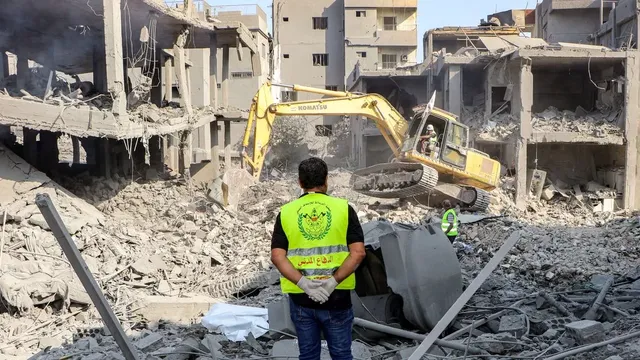
Israel Airstrikes in Beirut Kill 25 Amid Ongoing Conflict
2024-10-17 00:03- Israeli airstrikes resumed in Lebanon on October 17, 2024, after a six-day pause, resulting in at least 25 deaths.
- The strikes targeted Hezbollah officials and facilities, particularly in Qana and southern Beirut, causing significant civilian casualties.
- Lebanese officials condemned the attacks, accusing Israel of intentionally targeting civilians, raising concerns about the humanitarian impact of the ongoing conflict.
Express your sentiment!
Insights
In Lebanon, Israeli airstrikes resumed on October 17, 2024, after a six-day pause, resulting in at least 25 fatalities across the country. The strikes targeted Hezbollah officials, including Jalal Mustafa Hariri, the group's regional commander, and caused significant civilian casualties, particularly in the village of Qana, where 15 people died. Rescue operations were hampered by the destruction, with workers using bulldozers to search for victims among the rubble. The Israeli military justified the attacks by claiming they were aimed at Hezbollah command centers and weapons facilities located in civilian areas. However, Lebanese officials, including caretaker Prime Minister Najib Mikati, accused Israel of intentionally targeting civilian infrastructure and relief coordination meetings. Mikati expressed frustration over the international community's silence regarding the civilian toll, while UN officials voiced alarm over the attacks on non-combatants. The situation escalated tensions in the region, as the Israeli military continued its offensive despite prior assurances from the United States that attacks on Beirut would be curtailed. The ongoing conflict highlights the precarious balance between military objectives and the protection of civilian lives in a densely populated area known for its strong Hezbollah presence.
Contexts
The ongoing conflict between Hezbollah and Israel has escalated dramatically since the onset of the war on Gaza last October. Reports from Beirut indicate that the situation has devolved into a full-scale war, with significant casualties on both sides. The recent Israeli airstrike that killed Hezbollah's leader, Hassan Nasrallah, along with other commanders, has intensified the violence. Israel claims these strikes targeted Hezbollah's strongholds, while Hezbollah retaliates with attacks across the southern Lebanese border, marking nearly a year of hostilities that began as a response to Israel's military actions in Gaza, which have resulted in over 41,500 deaths. Historically, the roots of this conflict can be traced back to the Israeli occupation of southern Lebanon, which lasted until 2000. Hezbollah emerged as a formidable force during this period, successfully pushing Israeli troops back to the Litani River. The group has since evolved from a militant organization into a significant political player in Lebanon, holding a substantial number of seats in the parliament. However, the toll on civilians has been devastating, with thousands displaced and significant infrastructure damage reported during various military operations over the decades. The violence has not only affected military personnel but has also led to tragic civilian casualties. In past conflicts, such as the Qana Massacre in 1996, over 100 Lebanese civilians lost their lives, including many children. The current situation mirrors these past tragedies, with reports indicating that both sides are suffering heavy losses, and civilians are caught in the crossfire. As the conflict continues to unfold, the international community watches closely, hoping for a resolution that can bring peace to a region long plagued by violence. The humanitarian impact remains dire, with families displaced and communities shattered, raising urgent calls for ceasefire and dialogue to end the bloodshed.